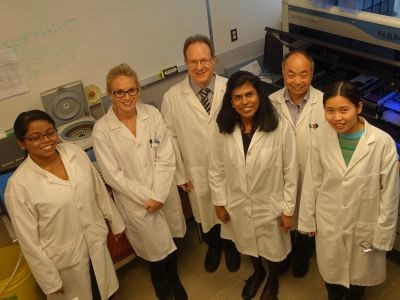Northern Ontario Angels (NOA) is living up to its angelic epithet with one of its latest deals.
The 100th deal closed by the NOA matched the Sudbury based bio-tech company Rna Diagnostics with funders from Northern Ontario to support its new service, a diagnostic test that can predict the efficacy of chemotherapy for breast cancer patients.
Dr. Amadeo Parissenti, founder of Rna Diagnostics, said his discovery — which could impact millions of women — is headed towards commercialization, with the construction of a lab in Sudbury and pilot projects around the world.
“They're here in the North but they're taking the global lead on determining whether or not a course of treatment for a woman who has breast cancer will be effective,” said Mary Long-Irwin, NOA's executive director.
“Sometimes women go through the whole rounds [of chemotherapy] only to find out it's not the right one, and they're not strong enough to do the next round and that's where we lose a lot of our women.”
Three quarters of breast cancer patients derive no survival benefit from chemotherapy, explained John Connolly, vice-president of corporate development for research. Rna Diagnostics' test would be able to indicate whether or not chemotherapy is an effective course as early as 14 days after starting treatment.
“There's way too much chemo being offered with no benefit,” said Connolly. “This will result in less toxicity, improved survival, and savings from $10,000 to $60,000 per patient.”
Getting funding for such a massive research project in the North, however, can be difficult.
“The angel investors come in when you get beyond friends, family and fools, there's angel networks,” said Connolly. “The banks won't touch this, but angel investors are entrepreneurs themselves and understand the challenges.”
“When people ask me what I do, I tell them it's much like Dragons’ Den without all the drama,” said Long-Irwin. “A company makes pitch, and we find funders.”
Established in 2005, NOA is one of several angel investor networks across Canada that links Northern Ontario investors, or angels, with growing Northern Ontario companies. A not-for-profit, NOA's administration is funded through FedNor, but the investments they co-ordinate are strictly from the private sector.
NOA leads the pack in angel networks and has had the highest number of deals in Canada for three years running. Their deals have led to approximately $40 million worth of investments by entrepreneurs, which leveraged $23 million in government funding and $45 million from commercial lenders. Angel investments primarily assist small to medium enterprises and the average deal runs around $400,000.
The investors expect a return of 10 to 15 times the amount of their initial investment. The Rna Diagnostics team is confident this will be the case.
Their chief financial officer, John Jordan, estimates there are $1 billion in market opportunities for the research being developed. He said there's an expanded market in areas such as rectal cancers, head and neck cancers, and even in canine lymphomas. Liquidity of assets is anticipated within five to seven years.
Long-Irwin is also certain of their success and pointed out that NOA's deals have a 96 per cent success rate. She is excited that this particular deal will help build the emerging bio-tech and research industry in Northern Ontario.
“When you have developed that important critical mass, you will find companies see it is more economical to be housed right here in the North and work with our universities, and it strengthens our economies,” said Long-Irwin.
“When you have companies like Rna Diagnostics coming here, then we have our kids saying, ‘Wait a minute: we can get jobs like these in the North.’”
John Jordan, chief financial officer for Rna Diagnostics, said the group currently employs five, but anticipates the lab, once complete, will house between 40 and 50 employees.
Next steps include expanding the lab and getting International Organization for Standardization (ISO) accreditation, which will take 12 to 18 months. Rna will also establish pilot clinics over six to nine months.
Parissenti said he will continue publishing research in the meantime.




